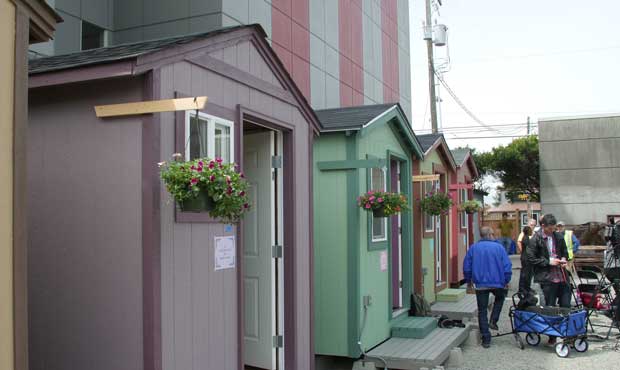Seattle cuts back funding from homeless agencies falling short of goals
Sep 24, 2018, 10:55 AM | Updated: 1:16 pm

Tiny houses on display May 30, 2018 as Seattle Mayor Jenny Durkan announced an increased effort to address homelessness with the homes. (Matt Pitman, KIRO Radio)
(Matt Pitman, KIRO Radio)
The money Seattle is spending on the homelessness crisis is showing better results than last year. At the same time, several contracted homeless agencies the city uses for housing are coming up short. For the first time, the city is holding them accountable and cutting back on funding.
RELATED: Seattle expands Navigation team responding to homelessness
Of the $86 million the city is spending on homelessness in 2018, the Human Services Department uses about $71 million on contracts with dozens of agencies that provide services to the homeless.
“What we’re seeing is in the first six months of 2018, we are housing about 35 percent more households who have been experiencing homelessness,” said Meg Oldberding with Seattle’s Human Services Department. “Really, our investments that we made last year are starting to pay off. We’re serving more people and more of those people are making it into housing. We’re not saying that we’re there yet. We still have a lot more work to do, but we’re trending in the right direction.”
The city money is focused in three main areas: Homeless prevention; emergency shelters; and housing. Agencies funded by the city provided services to more than 18,000 people, or households, with about 4,500 either moving into permanent housing or maintaining their housing in the first six months of 2018.
Olberding says they’ve seen positive results from their investments in diversion which offers one-time money combined with case management to help keep people from losing their housing and becoming homeless.
“We know that if they get into the shelter system it takes longer and costs more and is harder to get them out,” Olberding said.
The good numbers
Of the nearly 600 households to get diversion services in the first half of 2018, 72 percent exited to permanent housing — up 11 percent from last year. Rapid re-housing investments are also trending in the right direction. These investments combine up to a year of rental assistance with case management to get people back on their feet and paying for their own housing.
Those programs moved about 5 percent more people into housing in the first six months of this year from the same period in 2017 — after the city increased investments in those programs by nearly $3 million.
In the first half of 2018, nearly 4,100 people used enhanced shelters, which are generally open 24/7 and include space to store belongings, with case management. That’s about 7 percent more people using them from last year, but Olberding says the important number is how many of those people are making it into housing.
“The rate of people exiting to permanent housing, that is leaving the shelter system, has jumped from 14 percent to 21 percent,” Olberding said. “So the rate of them actually engaging in those services that we’ve invested in and then finding housing from there is, again, trending in the right direction.”
Seattle homeless agencies falling short
But not all of these programs are meeting the performance benchmarks. Those that didn’t meet the standards — moving enough people into housing — during the first quarter of 2018 got a pass while the city slowly rolled out the new accountability measures. That was not the case for the second quarter, as the city lowered funding for agencies not hitting their targets.
Overall, 65 percent of the programs met that standard, but 17 of 48 programs came up short. Those programs are losing 3 percent of their funding for the quarter.
“We really want to partner with them and look at what kind of assistance they might need to meet those standards, meet those targets and use the next two quarters of data to really figure that out with them and help them along,” Olberding said.
While the city has expanded its investment in tiny house villages and served more than 350 people in them so far this year, their success rate is down about 5 percent compared to last year – with only about 17 percent of people in them moving into permanent housing.
Emergency shelter and enhanced day centers, transitional housing, rapid rehousing, and permanent supportive housing programs are all subject to the performance pay standards. Sanctioned tent encampments and tiny house villages are not subject to performance pay standards.













